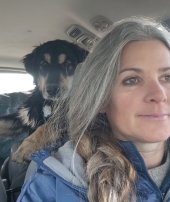posted 10 years ago
This year, 2015, was our third year raising pastured poultry, and was far and away our worst year for predators. (Reading around, it seems a third year spike is a fairly common occurrence, as the predators have finally figured out there are tasty birds to be had.) We raise primarily heritage breed chickens for meat in portable pasture shelters, so they are on pasture for quite a long time, upwards of 15 weeks.
Prior to this year our primary predators were hawks and owls. The hawks would periodically attack the free-ranging birds during the day, and the owls would land next to the shelter at night, reaching in and grabbing (but not extracting) a bird. The occasional loss to a hawk I can live with as a trade-off for free-ranging. The owl attacks, which increased dramatically this year, can (and will) be largely dealt with by redesigning our shelters (which are wearing out anyway) to include roost bars, getting the birds off the ground and away from those sharp talons.
But this year we faced a new predator, something that attacked the free-ranging birds during the day, removing the chickens without a trace. There are neighboring dogs, but I've never seen them near the field with the birds, and anyway dogs tend to kill and leave a carcass. Not hawks, as hawk attacks leave a pile of feathers, if not most of the carcass. My best guess is a fox or two or three. I find fox footprints after a fresh snow, so I know they're around.
Anyway, all of this to ask: does anyone have any experience using geese as guardian animals for smaller poultry? Not just as loud, honking alarm-sounders, but as honest-to-goodness predator deterrents? Can we raise a few adult geese in a 5-acre pasture with chickens, ducks, and cows and expect them to ward off those daytime predators? Or is the goose just not up to the task?






